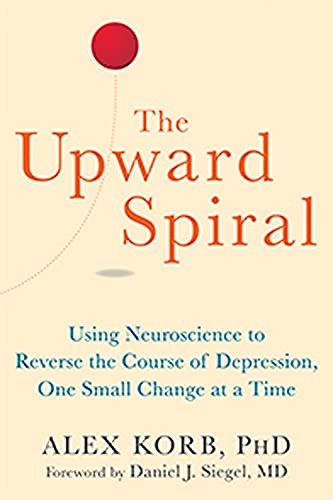The Upward Spiral: Using Neuroscience to Reverse the Course of Depression, One Small Change at a Time – Alex Korb PhD

The Upward Spiral by Alex Korb, PhD, is a revolutionary guide that helps readers overcome depression using a practical and evidence-based approach. Drawing from the latest neuroscience research, the book provides actionable strategies to reverse depression one small change at a time. With a focus on making incremental improvements, the author guides you through ways to break the cycle of downward spiral and set the course towards recovery.
Understanding Depression
Depression is a complex condition with both psychological and neurological components.
It is characterized by a constant negative thought loop, often rooted in seemingly insignificant triggers.
The depressed brain becomes a self-sustaining loop that feeds on itself, causing the symptoms to worsen over time.
The Ripple Effect of Small Actions
Even the smallest actions can have a profound impact on mental health.
Taking baby steps towards positive change can create a ripple effect, resulting in improved habits and healthier thought patterns that can guide an individual out of depression.
Effective Goal Setting
Setting realistic and attainable goals can be a significant step in overcoming depression.
Establishing specific, measurable, and time-bound goals helps to foster a sense of direction, purpose, and achievement, ultimately contributing to positive change.
Embracing Uncertainty
Accepting uncertainty as an inherent part of life can lessen its impact on mental wellbeing.
Developing the ability to tolerate uncertainty enables individuals to face challenges more effectively, reducing anxiety and dread, which in turn can aid in depression recovery.
Social Support Networks
Social connections play a pivotal role in mental health and depression recovery.
Developing strong social networks, seeking professional help, and maintaining relationships provide emotional and practical support, significantly improving the chances of overcoming depression.
Activation of the Prefrontal Cortex
Stimulating the prefrontal cortex can help counteract depression.
Engaging in activities that require focus and mental effort, such as problem-solving, can help activate the brain region.
This helps reduce rumination and negative thoughts, which contribute to the downward spiral.
Mindfulness and Meditation
Practicing mindfulness and meditation can help alleviate symptoms of depression by training the brain to break the cycle of rumination.
These practices enable individuals to enhance self-awareness, manage stress, and develop healthier thought patterns, ultimately contributing to an upward spiral.
Gratitude and Appreciation
Expressing gratitude and appreciation positively affects the brain, promoting the release of feel-good neurotransmitters.
Practicing these emotions helps to interrupt the loop of negativity and refocus attention on encouraging aspects of life.
The Power of Exercise
Exercise is a powerful tool in reversing depression.
It stimulates the release of neurotransmitters like serotonin, dopamine, and endorphins, which contribute to feelings of wellbeing and happiness.
Implementing regular physical activity can lift mood, improve cognitive function, and provide a sense of accomplishment.
Sleep and Depression
Poor sleep quality is a common problem in depression.
Improving sleep hygiene and controlling daily habits can help regulate mood and break the negative cycle.
Establishing a consistent sleep schedule, limiting screen time before bed, and creating a sleep-friendly environment are all essential steps in combating sleep disturbances.




